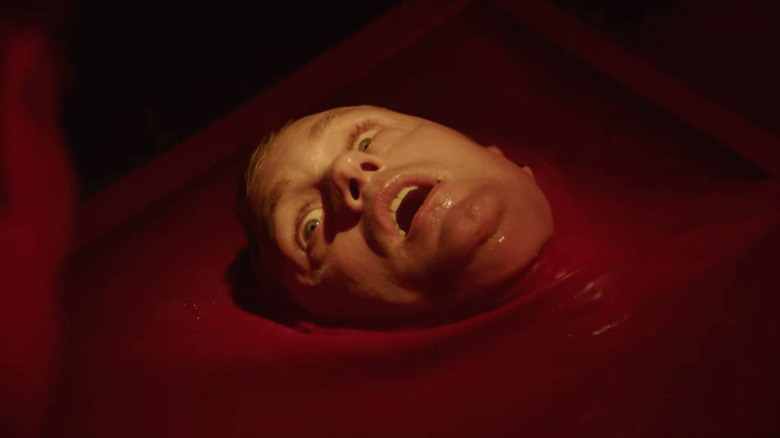Brandon Cronenberg Knows He Can't Escape Comparisons To His Father David Cronenberg's Work
To say that the Cronenberg name is a major one in the horror genre would be an understatement. Not only is David Cronenberg one of the most acclaimed directors of both disgusting horror and erotic discomfort, but his son Brandon is pretty damn talented in his own right. In my personal ranking of nepo-babies, he's up toward the top due to his striking and distinctly disturbing filmography.
However, if you watch something like "Possessor" with only the baseline knowledge of his father's work, it may seem like Brandon's trying to ape his style. In an interview with The New York Times, the younger Cronenberg said that these comparisons aren't surprising to him – how could they not? That being said, he's not letting them get to him, having already experienced such comparisons in the art industry.
"The truth is, I'm making movies that are interesting to me and honest to my own creative impulses," he said. "I think people like to see those patterns and it's something you can't escape."
He also admitted that being around filmmakers and sets at a young age gave him a bit of an advantage when branching out into filmmaking himself. Not necessarily through connections, but rather, through understanding what sets on legitimate movies are really like.
"Being around sets demystifies the filmmaking process," Brandon said. "When you're there, it's actually pretty boring. To a degree, I absorbed that."
More different than alike
In a way, the two Cronenbergs are actually fairly different as directors. Don't get us wrong, David and Brandon do touch upon similar themes – the body as a vessel, sexuality as an alluring weapon, and how capitalism takes advantage of these two ideas are shared between them. Then again, they aren't exactly the most original or untapped themes.
The thing that really sets the father and son apart, though, is the visual style in which these messages are conveyed. While not monochromatic, David's work is purposefully bland. His environments, while appropriately populated, are shot as drably mundane, but this is actually far from a bad thing. In fact, in films like "Dead Ringers" and "Eastern Promises," the accepted mundanity of his films' environments highlight their discomforting strangeness until it just bursts at the seams in the end.
On the contrary, Brandon is more robust in his visual style. While not oversaturated with color, his worlds feel more lived in than his father's. The problem, though, is that they aren't actually populated. Through this false sense of normalcy, the younger Cronenberg is able to disarm audiences through his bizarre scenarios that should be viewed by dozens or even hundreds in its universe but aren't. They're playing for an audience of no one. Ultimately, the two frame and shoot space is ultimately the major thing that sets them apart from each other, but that might be lost on more casual viewers who only want to watch their films for their weirdness.

